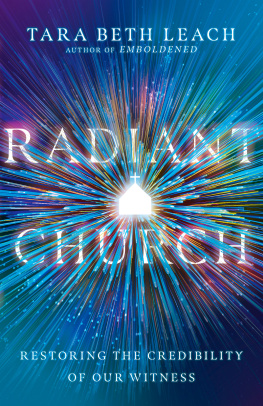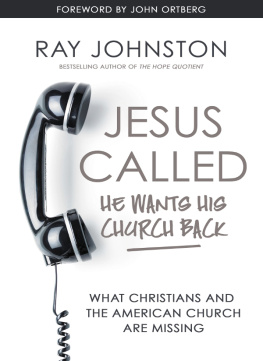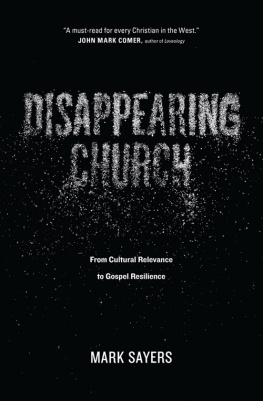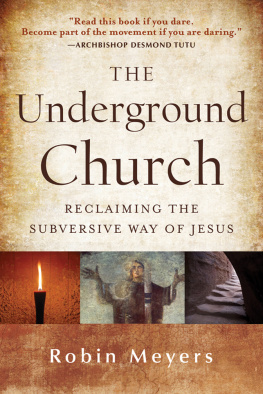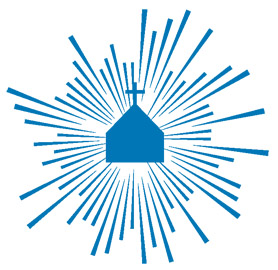SOMETHING ISNT RIGHT.
Theres been a time or two in my life when Ive visited my physician and said those very words. Usually, some odd symptoms will show up that cause me to feel a little bit off. Several years ago I had convinced myself I was experiencing heart failure. That may sound overdramatic, except my symptoms seemed to be quite serious.
I was always exhausted no matter what I did. My husband would be content with seven hours of sleep, but I seemed to need ten. My hair started to fall out, and my skin was pale. I was once a triathlete and could run for miles, but even walking up a flight of stairs caused me to be winded.
I then noticed that my heart rate would skyrocket when doing the slightest things like standing up and walking to the next room. Even preaching became difficult.
Something just isnt right, I told the doctor. I explained my symptoms, we ran some tests, and it turned out I was severely anemic.
When I look at the dearly beloved bride of Christ in North America, I see enough concerning symptoms for me to say, Something just isnt right. Im concerned about us.
CHICAGOLAND
I grew up in the peak of the 1990s youth ministry culturethink DC Talk, Jennifer Knapp, Switchfoot, WWJD bracelets, street evangelism, and my very own homemade bubble paint T-shirt that said Jesus Freak.
At sixteen I had a genuine thirst and love for Jesus, my newly discovered Lord and Savior. I grew up in a home of good, cultural Christians. I was baptized and confirmed in a mainline church. Sometime around my freshman year of high school, I developed a thirst for a more meaningful understanding of God. Im not sure what the trigger was, other than the prevenient grace of God. There was also a sense of curiosity about some of the things I heard from the Christians in school. Something about them was remarkably different. They were close to one another, and I longed for the sense of belonging and community they exuded. They talked about Jesus in almost mystical ways, and I wanted the same experience.
So there I was, in the late nineties, standing in the back of a log cabinthe meeting house for Campus Lifesearching for an answer for my yearning. Youth leaders and students testified about the goodness of Jesus, and I wanted more. Soon after, one of the youth leaders invited me to begin reading my Bible, so I didcover to cover. Every night, as fast as I could, I would race up to my bedroom to plow my way through the story of God. I was completely captivated.
When I arrived at the Gospel of Luke, my mind could hardly comprehend the goodness of Jesus and the horror of the cross. But there in my bedroom, I said yes to Jesus. I had no idea of how that moment would set the trajectory of my life, but it diddrastically.
As a newly minted Jesus freak, I was ready to set the world on fire for Jesus. I started with my own high school. Every week I would illegally pack eleven kids in my Toyota RAV4 and bring them to Campus Life. Mondays were my favorite day of the week. I would come to a school on Mondays with a stack of fliers for Campus Life, and I would leave school empty-handed with a car full of kids. I wanted the world to know Jesus as I knew him. Church was my haven of rest and peace; it was the place I wanted to be nearly every waking moment. If you would have told me the church had flaws, I would have fiercely defended it.
When I first learned about Billy Graham, I wanted to be just like him, but only because Billy was telling people about Jesus by the multitudes. Then I heard about Bill Hybels. Somewhere around 2001, I joined a carload of students to drive an hour north to the Willow Creek campus in Barrington, Illinois. When I walked into the lobby, I saw escalators and food courts. When I walked into the massive ten thousand-plus seat sanctuary, the hair on my arms stood up. Someone gets to preach to this many people every week?
From that day on, Willow Creek Community Church was the epitome of successthrough the eyes of a new Christian formed in Western evangelicalismin the economy of the kingdom: church growth, large buildings, and bodies in seats. In my mind this was the golden vision every pastor ought to strive for.
When I began my journey in ministry in the early 2000s as a Youth for Christ director, we used to compare attendance numbers in staff meetings and then high-five one another when attendance was crushing it. Theres hardly a pastor that would deny feelings of excitement when numbers are unusually high or when the pastor glances out in the sanctuary and the seats are full. Needing to build more prominent and more state-of-the-art sanctuaries can be a thrill, no doubt.
In my early days of ministry, I recall attending a church growth summit, and as a young associate pastor, I was enamored by one pastors account of growing a church from sixty to five hundred people. I couldnt take notes fast enough and couldnt wait to someday apply the tactics I learned that day. With a quick scroll through Google, we can learn all about the easy principles to church growth.
Numbers tend to be quite a big deal for pastors. This can be a helpful metric and is something we celebrate for a good reason. As someone who has been so profoundly impacted by the gospel of Jesus, I celebrate anytime someone decides to follow Jesus for the first time. I celebrate when lives are transformed within the body of Christ. I celebrate every time someone is newly baptized. These are just some of the few reasons I do what I do. Simultaneously, an emphasis on numbers as the golden metric for success can become unhealthy, especially when we pursue success at the expense of faithfulness or appearance at the expense of authentic community.

